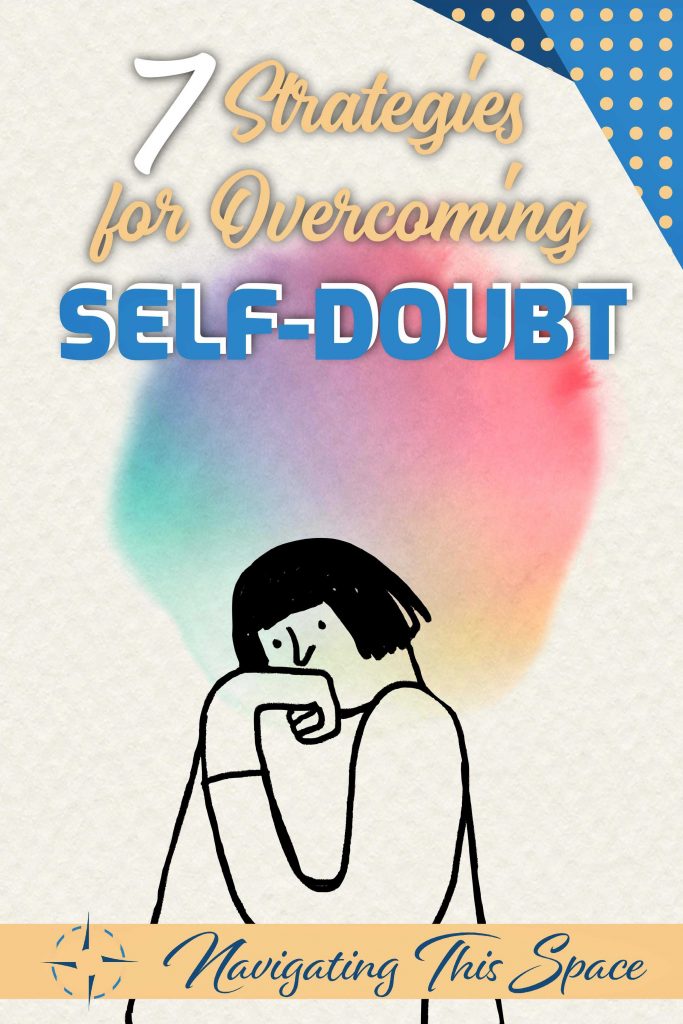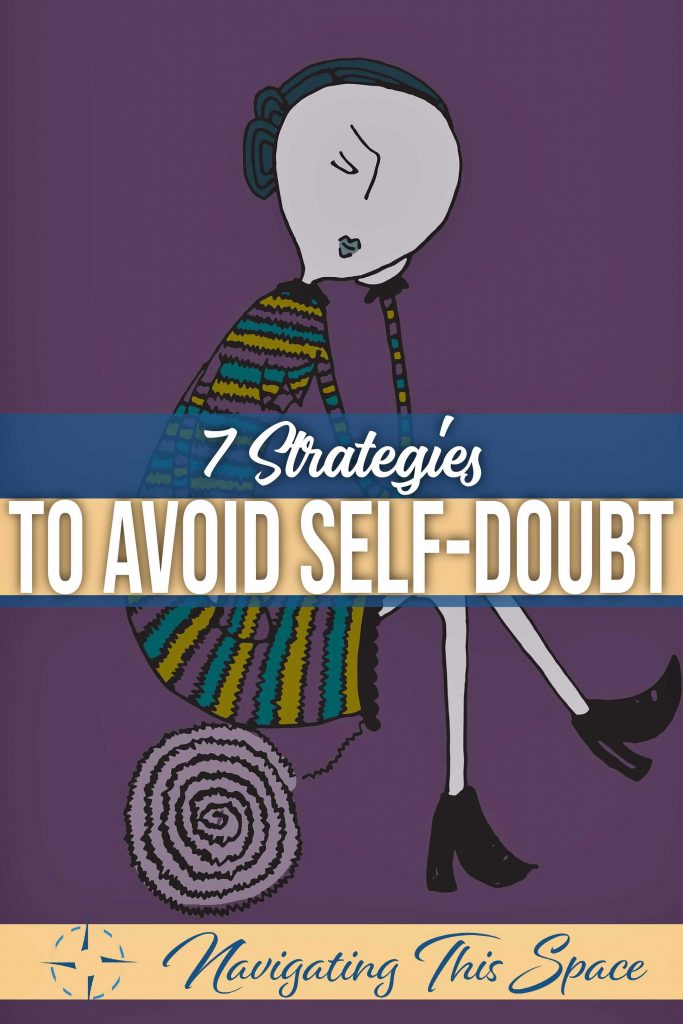How many times have you second-guessed yourself even when you know you’re right?
How many times have you convinced yourself that success is out of reach and you’re not good enough?
If it’s more than once, then it’s one too many. This is your wake-up call.
Self-doubt is one of the most self-sabotaging emotions. It can paralyze you and prevent you from taking action, from reaching your goals, or from even believing that your dreams are possible.
What’s worse is when self-doubt becomes habitual to the point that you believe your actions are just the way you are.
The fear of trying something new takes a toll on your mental health because you’re constantly living in a state of doubt. Your anxiety controls your every move, and you have a very warped sense of self.
If this sounds like you or someone close to you, then self-doubt is getting in the way of progress.
Don’t be discouraged. It’s not impossible to overcome self-doubt, and there are things you can do to stop self-doubting yourself before self-doubts arise in the first place.
In this article, I’ll share with you 7 strategies for avoiding common pitfalls of self-doubt.
What Is Self-Doubt?
According to Merriam Webster’s dictionary self-doubt is, “A lack of faith in oneself: a feeling of doubt or uncertainty about one’s abilities, actions, etc.”
Simply put, self-doubt means you don’t believe in your abilities, especially when you have no valid reason to doubt yourself.
Where Does Self-Doubt Come From?
Self-doubt manifests itself in many ways. It’s a feeling of self-consciousness that occurs when you’re unable to perform optimally. It’s the voice that tells you to be invisible when you want to shine and also lies to you by telling you that your ideas are not worth anyone’s attention.
It’s a form of self-criticism taught to you by your past rejections, experiences, and failures as a child.
The negative emotions you felt when you got a bad grade in school or didn’t know how to do something correctly weighed heavily on your mind and caused you to develop low self-esteem.
Those emotions followed you into your adult life while getting stronger and stronger as the years went by while your self-confidence, self-compassion, and mental health depleted.
Even though it’s terrible for your mental health, it’s actually a common fear that everyone feels at one point or more times in their lives. Even the most successful people in history have experienced their share of doubting their abilities.
But the key to not giving in to doubt is to know precisely what you’re capable of through self-awareness and by taking action.
How to Overcome Self-Doubt
It’s easy to say that self-doubters should stop feeling self-doubt because they doubt themselves. However, the doubt they feel comes from a deep place that they might not be aware of. So attacking self-doubt with self-assurance will not work because the self-doubters will rationalize their emotions by saying that they shouldn’t feel self-doubt in the first place.
The only way to get rid of self-doubt is to develop a keen sense of self, understand what you’re capable of, and build trust with yourself and those around you.
Then and only then will you eventually let those negative thoughts be replaced with positive thoughts resulting in a healthy, confident mindset.
Practice and discipline are needed to get those negative thoughts and habits under control. To banish the imposter syndrome, you must spend time with yourself and talk honestly about your fears and dreams.
The more self-aware you become, the easier self-doubt is to overcome.
The 7 Strategies for Overcoming Self-Doubt
Sometimes doubt creeps into your subconscious without you realizing it’s there. It’s important to be mindful of self-criticism so that self-doubt doesn’t coax and sabotage your mind and prevent you from moving forward with your plans or goals.
Here are some ways to get ahead of these vicious moments:
1) Analyze Your Self-Talks
The way you talk to yourself has a massive impact on how you treat yourself and how you’re treated.
The next time that voice in your head starts to tell you that you’re not worth it or you’re not good enough, challenge it and find the deeper reason why those words make you feel like a failure.
This can be done through journaling.
Journaling allows you to dive deeper into your past traumas to find the root of the problem, understand it, and let it go.
The only way forward with renewed self-confidence is going back and understanding where your doubt is coming from.
2) Get Rid of Perfectionism
Perfectionism is the killer of creativity.
This applies to every aspect of your life. When you free yourself from the pressures of being perfect, you’ll truly begin to start living exactly how you want.
Perfectionism is a habit, and all habits can be changed in time with dedication and discipline.
3) Face Your Fears Head-On
Running away from challenges in life is only inhibiting your personal growth.
Things that you think are scary or impossible are not as bad or as impossible as they seem.
Pushing through your fears can open up a world of opportunities and make you feel like a champion because you conquered something others have tried but failed to conquer before.
Understanding that everything in life takes time, practice, and a detailed plan of action to see the results you want.
When looking for the right solution to a problem, start with simple steps that have worked in the past. If you fail, you’ll have a clearer path of which way to go next.
Fear is an illusion your brain created to keep you safe, but playing it safe in life doesn’t allow you to achieve all the goals you are capable of accomplishing.
Take a deep breath, put on your warrior’s face, and tackle your fears. Nothing you face in life will ever be too much to fear, so keep pushing forward with all your might.
4) Have a Back-Up Plan
Never plan to fail. Always be prepared with another route if your plans don’t work out successfully the first time.
Failures aren’t detrimental. They are valuable lessons and advice that will lead you to the path you seek.
It’s very rare to succeed on your first try. You’re bound to make a million mistakes before you get it right.
That’s the journey of life. Once you fail, you try another way again. You fail again, and suddenly, you have solid data from the first two ways you tried that didn’t work. So instead of giving up, try another way.
The visual you have in your head is merely a suggestion for your brain.
Real-life doesn’t happen according to plan so be flexible and adapt to change instead of fighting it.
Having plans A, B, C, D, E, and F, will motivate you to review what didn’t work and apply it to the next step.
5) Increase Self-Awareness
Having a solid understanding of your thoughts, emotions, and values is key to living the life you want.
Each person is different, so it’s important to take the time and learn what makes you tick so that these qualities can be used towards your positive growth.
A simple way to do this is again by journaling. Reviewing your day in your journal every night before going to bed will allow you to identify what you did wrong, what went right, and what changes need to happen within yourself to grow into your authentic self.
Take time to get to know yourself since it’s imperative to your success.
6) Choose Your Confidants/Confidantes Wisely
The friends you entertain have an impact on your feelings and your thoughts. If they are helpful and supportive, keep them around. However, if they constantly doubt your every move, it’s time to let them go.
I grew up with a saying that goes like this, “Misery loves company,” which basically means that people love when other people suffer with them.
Most times, it doesn’t matter that a friend is a great person. Once they feel threatened that you’re about to excel and leave them behind, they become the external negative Nancy who tries to get you off your course.
It is sad to think that the ones closest to you will sometimes be the ones that are hindering your performance. Analyze the way you feel whenever that person comes around, and if your gut feeling is telling you that something is wrong, listen to it.
7) Celebrate Your Accomplishments
No matter how small they may seem, when you accomplish anything in life, celebrate it!
Keep a record of your past achievements, and throw yourself a congratulations party every time you accomplish a goal.
Every step you take is worth celebrating because it provides more proof that you are indeed capable of achieving anything you set your mind to.
Whether it’s your professional goals or your personal goals, your ability to accomplish them is reassurance that doubt and fear were mere illusions of a brief moment.
Bonus 8) Make Friends With Your Inner Critic
When positive self-talk becomes a healthy habit, that voice in your head will have no choice but to acknowledge your self-worth.
You are amazing just as you are, so make sure to stand up for your achievements and fight off destructive negative thoughts when they arise.
There’s always a message that is being sent your way whenever that voice starts to make its option heard.
Ignore the negative words, and dig deeper to the root of the problem. This will help you decipher what triggers these thoughts.
It Takes Time to Overcome Self-Doubt
Expand your mind into a place of endless possibilities and trust that you are where you need to be at this moment in time. So take a deep breath, relax, and just flow with the rivers of life.
The big picture will unfold exactly as it was intended, so don’t get too worked up about every last detail along the way because life never sticks to the plans we create.
Never doubt what you’re capable of accomplishing. Only doubt self-destructive behaviors and ideas. Embrace self-improvement and self-compassion.
YOU choose your path towards greatness.
Use these tips to focus on your goals and celebrate what you’ve accomplished along the way.
There will be times when self-doubt still tries to get in your head, but if you keep these tips close by, they’ll become much easier to deal with.
How have you dealt with self-doubt in the past? Feel free to share your story in the comments below.






💞💞💞 I needed this today. I have a brand new business, so self doubt has been a daily occurance for me lately.
Congrats on your new business Courtney, you can do it because you’re already doing it, so keep going!
Love the strategies! self-doubt is a slippery slope and your tips can really make a change, especially the self-talk portion. We are our meanest critics!
That’s true Nelly, we are our meanest critics but once we start believing in ourselves, what we can accomplish becomes limitless!